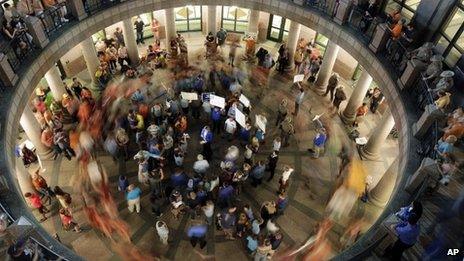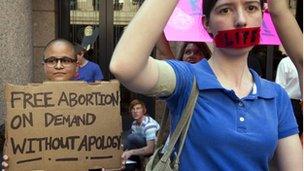Texas abortion bill advances after limited testimony
- Published

Some opponents of the bill walked in circles around other supporters inside the state capitol
Contentious Texas anti-abortion legislation previously blocked by a marathon delaying speech has advanced amid vigorous demonstrations.
A state House committee passed the bill after Republicans limited testimony and refused to allow Democrats' amendments.
The bill would ban abortions after 20 weeks of pregnancy and shut down most of the state's abortion clinics.
The legislation is widely expected to pass both houses of the Republican-controlled legislature and become law.
Last month, State Senator Wendy Davis, a Democrat, earned national prominence by halting the bill with a nearly 11-hour speech.
The following day, Texas Governor Rick Perry, a Republican who opposes abortion, called a special session to take up the abortion bill and other legislation.
'Just wrong'
Senator Wendy Davis spoke for 10 hours
On Tuesday, as many as 3,500 protesters swarmed the state capitol, with 1,100 signing up to testify in the House committee on state affairs on the legislation.
But fewer than 100 people were able to speak after committee chairman Representative Byron Cook limited testimony to eight hours, saying the panel had already heard from enough constituents.
Mr Cook refused to recognise any Democrat on the panel offering amendments, including Representative Sylvester Turner, a senior lawmaker.
"You can bring it up on the floor,'' Mr Cook told Mr Turner, referring to the upcoming debate in the full House.
Mr Turner replied angrily: "You know that's just wrong."
The bill passed along party lines after midnight, setting up a vote in the full House next week.
It is expected to pass both the Republican-controlled House and Senate, over the efforts of Democrats and abortion rights activists, and Mr Perry has vowed to sign it into law.
The bill came near to passage last month but was blocked in the state Senate when Ms Davis spoke for nearly 11 hours - in a delaying speech known as a filibuster - in an attempt to run out the clock on the legislative session.
Medical groups opposed

Protesters from both sides filled the state capitol on Tuesday
The filibuster drew nationwide attention and made Ms Davis a heroine of the US abortion rights movement.
In addition to banning abortions after 20 weeks of pregnancy, the bill would require all abortion procedures to be performed at a surgical centre, and mandate all doctors performing abortions have admitting privileges at a hospital within 30 miles (48km) of the clinic.
Only six of Texas' abortion clinics can be classified as surgical centres, and all are in major metropolitan areas, according to the Texas Tribune, external. Critics say the provision would force some women to travel hundreds of miles to have an abortion, while supporters say it would protect women's health and the foetus.
Among the bill's opponents are the Texas Medical Association, the Texas Hospital Associations and the American College of Obstetrics and Gynecology.
On Tuesday, the House state affairs committee heard personal stories from both sides. Some women said they had regretted having an abortion, while others said it had given them a second chance.
"In this country, we've forgotten about a big law: 'Thou shall not kill,'" said bill supporter Dorothy Richardson of the Houston Coalition for Life.
Opponent Gay Caldwell told lawmakers women's health is only protected when abortion is legal and safe.
"This bill is about women's lives, and I don't think you want to play politics with women's lives," she said.
The US Supreme Court legalised abortion nationwide in 1973, but about a dozen states have enacted laws in recent years limiting access to the procedure. Some of that state legislation is tied up in court battles.
- Published1 July 2013
- Published12 December 2012
- Published26 June 2013